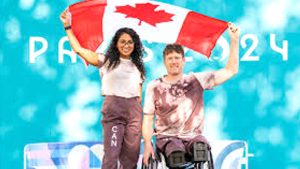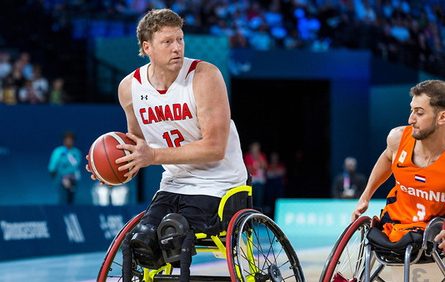BROOKLYN, NY – Hot off the Paralypmic Games, where Canada’s men’s wheelchair basketball team came close to winning bronze but fell to Germany, Patrick Anderson is proud, reflective and a little exhausted.
Anderson has played for Canada’s national team since 1997 and since then he’s been in six Paralympics and won three golds and one silver.
He is considered the greatest wheelchair basketball player in the world. And he grew up in Fergus.
At age 45, after four decades of intense play on the world stage, Anderson has decided the 2024 games will be his last.
“It’s been an emotional wave,” he said in a phone interview from his home in Brooklyn, New York, where he lives with his wife and three children, aged 4, 7 and 9.
“I’m still coming off the high.”
Obviously, playing an Olympic sport takes physical and mental fortitude.
Anderson said it is taking him longer to recover from the physical toll of high-calibre play and that’s the main reason he decided to retire from the sport.
He’s said that before though – after the 2008 Paralympic Games and after the 2012 Games. And he very nearly called it quits after the Tokyo Paralympic Games in 2020.
But the siren call of basketball kept calling him back. And he had some business to finish – especially after Tokyo when there were so many restrictions due to COVID-19 and no audience in the stands.
“I left Tokyo feeling incomplete,” he said. “I decided I wanted to take a crack at it again.”
This time retirement will stick, he said with a laugh.
“I guess it’s a dubious thing to hear when the player is 20 or 30. I’m 45 now. I have three kids and time to establish another career. I have other things to explore,” he said.
He and his wife Anna Paddock are both musicians and together form the band The Lay Awakes.
Paddock is an accomplished singer, pianist and songwriter. Anderson studied music and jazz guitar in his youth when he wasn’t on the basketball court.
“We put the band on the back burner for a few years, so I’d like to return to that. I also want to do some public speaking at schools and at businesses,” he said.
“I’m casting a wide net … I also want to give back to sports so I’m not walking away from it entirely.
“The Paralympic umbrella is big but it’s also a big world.”
Last year Anderson and family spent the year in Spain – he playing professional wheelchair basketball and his family close by for games and tournaments.

Para swimmer Katarina Roxon, left, and wheelchair basketball player Patrick Anderson were the flag bearers for the 2024 Paralympic Games in France earlier this year.
When Team Canada qualified in April for the Paralympics – “no small feat in itself,” he interjected – his family was there to see it.
And they were there in Paris for these games, where the kids saw their dad on the court and had a “fantastic time” by Anderson’s reckoning.
That was the sweet part of these bittersweet games.
“It was tough, and we came close to the perfect ending. And we had a great run, as a team, for wheelchair basketball, and for the county,” he said.
“I told the guys before we started that this is the end for me. But I was going to give them 10 more days of my best stuff. I was totally engaged mentally.”
And he did. And the team gave their all, too.
Canada was ahead 35-27 at half time in the battle for bronze with Germany. But Germany attacked the third quarter with vigour and inched ahead of Canada.
And by the fourth quarter, they were unstoppable.
Germany came out the victor, 75-62.
“I was in a really good place during the tournament,” Anderson said. “Physically, I was feeling fresh. It’s when you get tired that the wheels come off.
“The coaches, physios – they did a great job. I felt physically great, so mentally I felt great too.”
Speaking of great, Anderson said he’s grown used to hearing “The Great Patrick Anderson” when he’s introduced or even by play-by-play commentators.
“It sounds arrogant to say, but I’m used to it,” he said in his unassuming way.
“At the end of the day, my expectations for myself are higher than anything put on me from outside. For me, I rise to the pressure.”
Anderson and para-swimmer Katarina Roxon were chosen to be the flag bearers for the opening ceremony at the Paralympics, an honour Anderson found both exciting and humbling.
Team Canada, of course, consists of teams and athletes from many different sports and Anderson certainly didn’t know all of them.
“But at the opening ceremony, that’s the first time all of Team Canada gathers together and represents the full country,” he said.
“Canada is a very diverse place. And in that moment, in that time and place, I was reminded we are all on the same team.”
Anderson has also been an ambassador for the Paralympic games in general and that’s a role he’ll likely continue.
“I want to move the Paralympic games forward and get more eyeballs on the game,” he said.
“In its own way it helps improve life for people with disabilities.”



